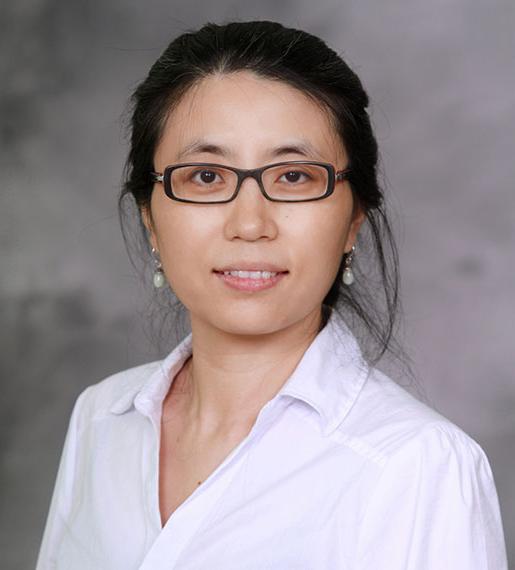Jianning Wei, Ph.D.

Associate Professor, Biomedical Science
777 Glades Road
Boca Raton, FL 33431
BC 71, Room 210
p: 561-297-0002
Department: Biomedical Science
Biography
Dr. Wei’s group is interested in understanding the molecular pathogenesis of neurodegenerative diseases using a combination of molecular, genetic, biochemical and imaging approaches. Proteostasis maintenance is critical for neuronal functions due to the specialized structure and post-mitotic property of neurons. Disturbance in proteostasis leads to accumulation of misfolded proteins, a common theme in many neurodegenerative diseases. We are particularly interested in how protein misfolding affects neuronal functions at molecular levels. Huntington’s disease (HD) is a devastating fatal neurological disorder caused by a pathological expansion of CAG repeats in the huntingtin (htt) gene. Mutant Htt misfolds and forms protein aggregates. Using Huntington’s disease as a model to study protein misfolding, current efforts have been directed to investigate the molecular functions of huntingtin. Specifically, our lab focuses on the following research themes: (1) What is the role of huntingtin in protein/organelle trafficking and how does mutant huntingtin interfere with it?, (2) What is the role of huntingtin in glial functions and how does mutant huntingtin affect glial functions, (3) Proteostatic machinery in HD.
The other aspect of our ongoing research is to investigate neuroregeneration. We have a highly interdisciplinary team that combine both biomedical, mechanical engineering and neurobehavioral expertise to investigate peripheral neuron regeneration in response to different stimulations using a novel microfluidic platform.
View Dr. Wei's PubMed feed.
Education
- 1999: B.S., Organic Chemistry, University of Science and Technology of China, Hefei Anhui, P.R.China
- 2003: Ph.D., Biochemistry, University of Kansas, Lawrence, KS, USA,
- 2003-2005: Fellow, Florida Atlantic University, Boca Raton, FL, USA
Work History
- 2013-Present: Associate Professor, Department of Biomedical Science, Charles E. Schmidt College of Medicine, Boca Raton, FL.
- 2008-2010: Affiliated Assistant Professor of Biochemistry and Molecular Biology, University of Miami Miller School of Medicine.
- 2006-2013: Assistant Professor, Department of Biomedical Science, Charles E. Schmidt College of Medicine, Boca Raton, FL.
- 2006: Research Assistant Professor, Department of Biomedical Science, Charles E. Schmidt College of Science, Boca Raton, FL.
- 2003-2005: Postdoctoral Fellow , Department of Biomedical Science, Charles E. Schmidt College of Science, Florida Atlantic University, Boca Raton, FL.
Scholarly Activity
Research Interests
- To investigate protein-protein interaction using a combination of biochemical methods and mass spectrometry.
- Molecular mechanisms of age-related neurodegenerative diseases, such as Alzheimer's disease, Huntington's disease.
- The physiological function of Huntington interaction protein (HIP14) as a neuronal palmitoyl transferase.
Peer-Reviewed Publications
- Huang, N., Erie, C., Lu, M., Wei, J. (2017) Aberrant subcellular localization of SQSTM1/p62 contributes to increased vulnerability to proteotoxic stress recovery in Huntington’s disease. Mol. Cell. Neurosci. 88: 43-52. PMCID: PMC5893379
- Erie, C., Sacino, M., Houle, L., Lu, M., Wei, J. (2015). Altered lysosomal positioning affects lysosomal functions in a cellular model of Huntington's disease. Eur J Neurosci. doi: 10.1111/ejn.12957. [Epub ahead of print] PMID: 25997742
- McCollum, M., Leon, R., Rush, D., Guthrie, K., Wei, J. (2013) Striatal oligodendrogliogenesis and neuroblast recruitment is increased in the R6/2 mouse model of Huntington's disease. Brain Res. pii: S0006-8993(13)00572-6. doi: 10.1016/j.brainres.2013.04.030. [Epub ahead of print]
- Rush, D., Leon, R., McCollum, M., Treu, R., Wei, J. (2012) Palmitoylation and trafficking of GAD65 is impaired in a cellular model of Huntington disease. Biochem J. 442(1) 39-48.
- McGreal, R.S., Kantorow, W.L., Chauss, D.C., Wei, J., Brennan, L.A., Kantorow, M. (2012) αB-crystallin/sHSP protects cytochrome c and mitochondrial function against oxidative stress in lens and retinal cells. Biochim Biophys Acta. 820(7), 921-30.
- Krishnamoorthy, S., Ma, Z., Zhang, G., Wei, J., Auerbach, SB., Tao, R. (2010) Involvement of 5-HT(2A) Receptors in the Serotonin (5-HT) Syndrome caused by Excessive 5-HT Efflux in Rat Brain. Basic Clin Pharmacol Toxicol. 107 (4), 830-41.
- Leon, R., Bhagavatula, N., Ulukpo, O., McCollum, M., Wei, J. BimEL as a possible molecular link between proteasome dysfunction and cell death induced by mutant huntingtin. Eur J Neurosci. 31, 1915-1925. 2010.
- McCollum, M., Ma, Z., Cohen, E., Leon, R., Tao, R., Wu, J-Y., Maharaj, D., Wei, J. Post-MPTP treatment with granulocyte colony-stimulating factor improves nigrostriatal function in the mouse model of Parkinson's disease. Mol Neurobiol. 41(2-3), 410-9. 2010.
- Wei, J.N., Lin, C-H., Wu, H., Jin, Y., Lee, Y-H., and Wu, J-Y. Activity Dependent Cleavage of Brain Glutamic Acid Decarboxylase 65 by Calpain J. Neurochem. 98(5), 1688-95. (2005).